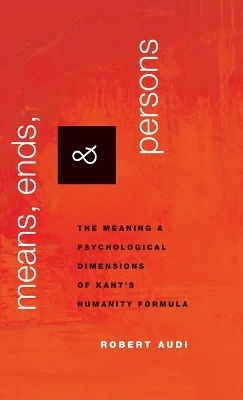
Means, Ends, and Persons
Oxford University Press Inc (Verlag)
978-0-19-025155-0 (ISBN)
No one wants to be treated merely as a means-"used," in a sense. But just what is this repugnant treatment? Audi's point of departure is Kant's famous principle that we must treat persons as ends in themselves and never merely as means. Treatment of these kinds is conduct, a complex three-dimensional notion whose central elements are action, its motivation, and the manner of its performance. He shows how the notions of treating persons as ends and, by contrast, merely as means, can be anchored outside Kant and clarified in ways that enhance their usefulness both in ethical theory and in practical ethics, where they have much intuitive force.
Audi constructs an account of treatment of persons-of what it is, how it differs from mere interpersonal action, and what ethical standards govern it. In accounting for such treatment, the book develops a wider conception of ethics than is commonly implicit in utilitarian, deontological, or virtue theories. These results contribute to ethical theory, but in its discussion of diverse narrative examples of moral and immoral conduct, the book also contributes to normative ethics. Audi's theory of conduct takes account of motivational elements that are not traits of character and of behavioral elements that are not manifestations of virtue or vice. Here it goes beyond the leading virtue approaches.
The theory also advances rule ethics by framing wider conception of moral behavior-roughly, of acting morally. The results advance both normative ethics and ethical theory. For moral philosophy, the book frames conceptions, articulates distinctions, and formulates principles; and for practical ethics, it provides a multitude of cases that illustrate both the scope of moral responsibility and the normative standards for living up to it.
Robert Audi is an internationally known contributor to ethics. He has published books and numerous papers in the field, and he lectures widely in ethics, moral psychology, philosophy of action, and related areas.
Preface and Acknowledgments ; Introduction ; Part One ; The Ethics of Protecting Persons ; Chapter 1 ; The Instrumental Treatment of Persons ; Means and Ends ; Instrumental Versus End-Regarding Treatment ; Treating Solely as a Means versus Merely as a Means ; Chapter 2 ; Instrumental Treatment as Human Conduct ; The Motivation and Controllability of Merely Instrumental Conduct ; Constraints, Moral Character, and Self-Control ; Motivation, Constraints, and the Appraisal of Character ; Chapter 3 ; Action, Treatment and Conduct ; Action, Endeavor, and Consequence ; Two Levels of Behavioral Description ; Conduct as a Morally Important Category ; Manners of Action Versus Actions as Defined by Manner ; Chapter 4 ; The Wrong-Making Character of Merely Instrumental Treatment ; Thick and Thin Moral Questions ; Substantive and Contrastive Views of Merely Instrumental Treatment ; Persons as Ends Versus Good Ends for Persons ; Internal and External Goods for Persons ; Part Two ; The Ethics of Respecting Persons ; Chapter 5 ; Treating Others as Ends in Themselves ; Caring about the Good of Others ; Two Kinds of Normativity ; Descriptive Grounds of End-regarding Treatment ; Chapter 6 ; End-Regarding Treatment and Respect for Persons ; Good Deeds, Good Reasons, and Good Conduct ; End-Regarding Treatment, Intention, and Interpersonal Behavior ; The Particularity of Persons and the Interchangeability of Means ; Chapter 7 ; Autonomy and the Moral Significance of Our Self-Conceptions ; Psychological Dispositions and the Basis of Consent ; Respect for Persons, Point of View, and Informed Rational Desire ; End-Regarding Treatment and Respecting Moral Rights ; Conduct Toward Persons versus Behavior Affecting Them ; Chapter 8 ; Conduct, Intention, and Will ; Motivational Self-Control and the Scope of Intentions ; The Manner of Interpersonal Conduct ; Moral Requirements and the Content of Intention ; Conduct Requirements and the Love Commandments ; Conclusion ; Index
| Erscheint lt. Verlag | 11.2.2016 |
|---|---|
| Verlagsort | New York |
| Sprache | englisch |
| Maße | 213 x 142 mm |
| Gewicht | 318 g |
| Themenwelt | Geisteswissenschaften ► Philosophie ► Ethik |
| Geisteswissenschaften ► Philosophie ► Philosophie der Neuzeit | |
| Geisteswissenschaften ► Religion / Theologie | |
| Sozialwissenschaften ► Politik / Verwaltung ► Politische Theorie | |
| ISBN-10 | 0-19-025155-7 / 0190251557 |
| ISBN-13 | 978-0-19-025155-0 / 9780190251550 |
| Zustand | Neuware |
| Informationen gemäß Produktsicherheitsverordnung (GPSR) | |
| Haben Sie eine Frage zum Produkt? |
aus dem Bereich


